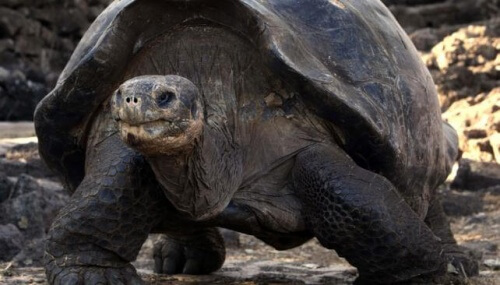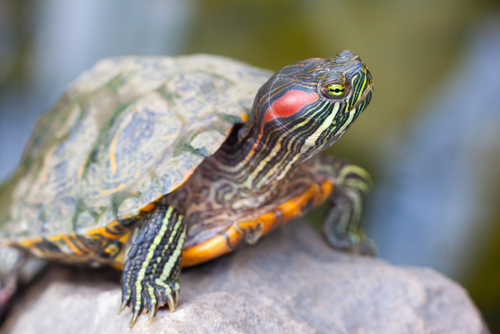How to Determine a Turtle's Age


Written and verified by the lawyer Francisco María García
Knowing your turtle’s age is an important prerequisite for proper care. The reason is that how you take care of him and feed him should vary according to his stage of development.
Turtles are the most friendly reptile pets. They are especially well-known for their long life expectancy. When they’re healthy, certain turtles can live for over a century.
The Galápagos Islands
The oldest turtles live on the Galápagos Islands, which are part of Ecuador. It is believed that some sea turtles there are over 250 years old.

However, life expectancy varies from one animal to another. It also depends on the developmental conditions of each habitat. There are all kinds of difference between a pet turtle’s environment and a wild turtle’s habitat. As a result, the length of their lives differ.
Life Expectancy of Pets
Any pet’s life expectancy depends on their habitat. Even a species with the highest life expectancy could die early if they live in a hostile environment. Therefore, before choosing any type of pet, be sure to plan and accommodate your home to the animal’s needs.
A turtle is an excellent animal to have as a pet. They adapt to small spaces and don’t take much time to take care of. They are independent, quiet and risk-free.
Life Expectancy of Pet Turtles
Many pet turtles live longer than they do in their natural habitats. Basically, it’s because your home contains fewer dangers and predators than the wild. Therefore, captive breeding is one way that endangered animals are protected.
In terms of domestication, responsible pet ownership is of course vital. All species need proper care to survive and live with dignity. This includes adequate food, space to develop and move, and regular vet check-ups.
Before choosing a turtle as a pet, understand the commitment you’re making. After all, you’re committing to take care of them the rest of their long life. Remember this before giving a turtle as a gift, too.
How to Determine a Domestic Turtle’s Age
When it comes to a wild animal, it’s quite difficult to accurately guess its age. In captivity, it’s easier to determine a turtle’s age and estimate its life expectancy.
The assumption is that an average domestic water turtle can live to nearly 80 years old, provided optimal development conditions, of course. Land turtles have a longer life expectancy: up to 150 years in captivity.
The most common method to determine a turtle’s age is based on observing the lines that form on their shells. It’s very similar to the way you would determine the age of a tree, by counting the rings on the inside of its trunk.
A turtle’s shell is a type of skeletal structure made of plates that are an extension of its ribs and vertebrae. These skeletal plates are surrounded by other plates known as shields.
As newborns, turtles have very small, smooth plates on the surface of their shell. Over time, the shields grow along with the turtle’s body. Each year, more and more lines appear; they are known as growth striae. Therefore, to determine a turtle’s age, you can count the lines on its shell.
How to Extend the Life Expectancy of a Pet Turtle

A domestic turtle’s life expectancy basically depends on the care the owner provides. Water turtles need a good fish tank. Also be very careful with the water’s potability and hygiene.
Tortoises can roam freely in your home, especially if there is a garden or yard. If not, you can also buy them a terrarium.
In either case, the animal needs room to move. Therefore, the fish tank and terrarium must be at least 4 or 5 times the size of the turtle. They need to have sunlight or direct lighting. Warm climates are ideal; the temperature of their environment is above 24ºC.
Another key aspect is the turtle’s food. You can find special food in stores for aquatic and terrestrial turtles according to their growth phase. This should be the foundation of a balanced diet.
To complement a good diet, give your turtle plenty of fruits and vegetables. However, don’t give it citrus fruits, bananas or cruciferous vegetables (especially spinach).
A turtle’s age is says a lot about how well their owner took care of them. Responsible ownership is the best way to prevent disease and prolong a turtle’s life.
Knowing your turtle’s age is an important prerequisite for proper care. The reason is that how you take care of him and feed him should vary according to his stage of development.
Turtles are the most friendly reptile pets. They are especially well-known for their long life expectancy. When they’re healthy, certain turtles can live for over a century.
The Galápagos Islands
The oldest turtles live on the Galápagos Islands, which are part of Ecuador. It is believed that some sea turtles there are over 250 years old.

However, life expectancy varies from one animal to another. It also depends on the developmental conditions of each habitat. There are all kinds of difference between a pet turtle’s environment and a wild turtle’s habitat. As a result, the length of their lives differ.
Life Expectancy of Pets
Any pet’s life expectancy depends on their habitat. Even a species with the highest life expectancy could die early if they live in a hostile environment. Therefore, before choosing any type of pet, be sure to plan and accommodate your home to the animal’s needs.
A turtle is an excellent animal to have as a pet. They adapt to small spaces and don’t take much time to take care of. They are independent, quiet and risk-free.
Life Expectancy of Pet Turtles
Many pet turtles live longer than they do in their natural habitats. Basically, it’s because your home contains fewer dangers and predators than the wild. Therefore, captive breeding is one way that endangered animals are protected.
In terms of domestication, responsible pet ownership is of course vital. All species need proper care to survive and live with dignity. This includes adequate food, space to develop and move, and regular vet check-ups.
Before choosing a turtle as a pet, understand the commitment you’re making. After all, you’re committing to take care of them the rest of their long life. Remember this before giving a turtle as a gift, too.
How to Determine a Domestic Turtle’s Age
When it comes to a wild animal, it’s quite difficult to accurately guess its age. In captivity, it’s easier to determine a turtle’s age and estimate its life expectancy.
The assumption is that an average domestic water turtle can live to nearly 80 years old, provided optimal development conditions, of course. Land turtles have a longer life expectancy: up to 150 years in captivity.
The most common method to determine a turtle’s age is based on observing the lines that form on their shells. It’s very similar to the way you would determine the age of a tree, by counting the rings on the inside of its trunk.
A turtle’s shell is a type of skeletal structure made of plates that are an extension of its ribs and vertebrae. These skeletal plates are surrounded by other plates known as shields.
As newborns, turtles have very small, smooth plates on the surface of their shell. Over time, the shields grow along with the turtle’s body. Each year, more and more lines appear; they are known as growth striae. Therefore, to determine a turtle’s age, you can count the lines on its shell.
How to Extend the Life Expectancy of a Pet Turtle

A domestic turtle’s life expectancy basically depends on the care the owner provides. Water turtles need a good fish tank. Also be very careful with the water’s potability and hygiene.
Tortoises can roam freely in your home, especially if there is a garden or yard. If not, you can also buy them a terrarium.
In either case, the animal needs room to move. Therefore, the fish tank and terrarium must be at least 4 or 5 times the size of the turtle. They need to have sunlight or direct lighting. Warm climates are ideal; the temperature of their environment is above 24ºC.
Another key aspect is the turtle’s food. You can find special food in stores for aquatic and terrestrial turtles according to their growth phase. This should be the foundation of a balanced diet.
To complement a good diet, give your turtle plenty of fruits and vegetables. However, don’t give it citrus fruits, bananas or cruciferous vegetables (especially spinach).
A turtle’s age is says a lot about how well their owner took care of them. Responsible ownership is the best way to prevent disease and prolong a turtle’s life.
This text is provided for informational purposes only and does not replace consultation with a professional. If in doubt, consult your specialist.








